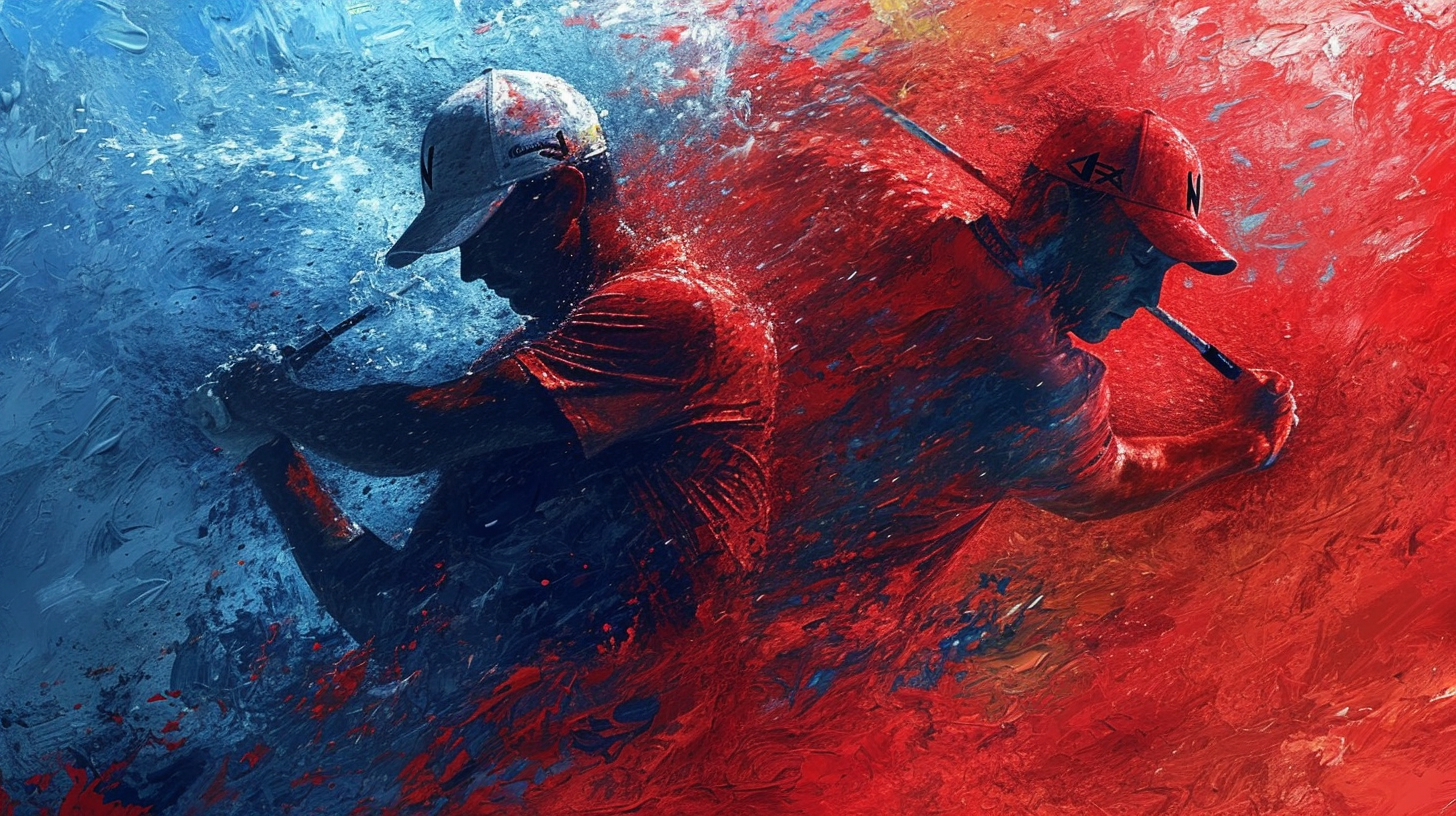When Justin Rose of Great Britain won the gold medal at the return of Olympic golf in 2016, it marked the end of a 112-year drought since a Brit took home gold in the sport.
While golf’s lengthy absence from the Olympics extended across most of the 20th century, golf was reinstated for the 2016 Rio Games and is now poised to remain an Olympic staple through at least the 2024 Paris Olympics.
But does a sport like golf actually belong in the pinnacle multisport event that is the Olympics? Let’s examine golf’s past and future Olympic status to evaluate where it stands.
History Of Golf In The Olympics

Golf Was Part Of The Olympics Early On, With Medals Awarded In 1900 And 1904. The sport of golf was included in the Olympics early in the history of the modern Olympic Games, being contested as an official medal event at the 1900 Paris Olympics and 1904 St. Louis Olympics.
At the 1900 Paris Olympics, golf was played over a total of two days at the Compiègne Club de Golf course located outside of Paris.
The men’s individual event consisted of a 36-hole stroke play tournament with three American men sweeping the podium and Charles Sands winning the gold medal with scores of 82 and 85.
The 1900 Olympic golf tournament also featured a separate women’s individual 9-hole event limited to French female golfers in which Margaret Abbott from the United States took gold. At the 1904 St.
Louis Olympics, held in the United States, the men’s individual 72-hole golf competition was expanded to three full days of play. Canadian George Lyon claimed the gold medal, prevailing by eight strokes with rounds of 82, 82, 85 and 87.
Golf Was Removed From The Olympic Program After 1904. Despite debuting as an official sport during the first few modern Olympic Games, following the 1904 St. Louis Olympics, golf was removed from the Olympic program.
Consequently, for over a century between the 1904 and 2016 Summer Olympics, there was no golf competition at the Olympic Games. A combination of factors contributed to golf being cut as an Olympic sport after just two Games in the early 1900s.
The lengthy multi-day format of Olympic golf tournaments was not viewed as fitting for the vision of the modern Olympics. Additionally, the early Olympic golf events struggled to attract top players from different countries and lacked global participation and appeal.
With other sports vying for inclusion in the Olympics, golf ended up making way after 1904. There were subsequent periodic efforts to get golf reinstated for future Olympics that all proved unsuccessful for years.
Efforts To Reinstate Golf As An Olympic Sport Over The Decades. Starting not long after golf was dropped from Olympic competition, there were various attempts made over the decades to campaign for the sport to be added back to the Olympic program.
Golf legends Bobby Jones and Arnold Palmer were among the more prominent voices advocating for golf’s Olympic reinstatement in the mid-20th century. By the 1980s and onward, leaders of professional golf tours and associations increasingly backed bids to return Olympic golf.
For the 2016 and 2020 Summer Olympics, the International Olympic Committee implemented an extensive review of potential new sports. Golf, along with rugby and softball, made strong cases in this evaluation process and gained enough votes for Olympic inclusion.
Golf associations cite the global appeal and accessibility of the sport at all skill levels as reasons it belongs in the modern Olympic Games.
Golf Reinstated For 2016 Olympics

Golf Returns As An Official Olympic Sport Starting In 2016 Rio Olympics. After a 112-year absence, golf officially returned to the Olympics with the inclusion of both men’s and women’s golf competitions at the 2016 Rio de Janeiro Summer Olympic Games in Brazil.
Its return came after golf and rugby successfully outbid baseball/softball, karate, roller sports, squash and wakeboarding for inclusion based on presenting the most value in terms of global participation and popularity.
Golf being reinstated as an Olympic event was the culmination of over two decades of joint lobbying efforts from various major professional golf tours and associations.
Olympic golf was strongly championed by Arnold Palmer and Tiger Woods to the International Olympic Committee. The build-up to golf’s reintroduction at the 2016 Rio Olympics generated substantial excitement within the sport.
Format Of Olympic Golf Competition – Individual Stroke Play Event For Men And Women.
As decided by the International Golf Federation and International Olympic Committee, the format for the revived Olympic golf tournament is a four-round individual stroke play event comprising 72 holes for both male and female competitors.
There are no team competitions in Olympic golf. The field size for each of the men’s and women’s Olympic golf events is 60 players.
Qualification and eligibility for the 60 player Olympic golf fields is based onOfficial World Golf Ranking standings in the run-up to a given Olympics. Countries are restricted to two golfers for countries with players in the top-15 world rankings and a maximum total of four golfers combined between the men’s and women’s fields.
The four rounds of Olympic stroke play span four days at 72 holes, with no cuts made to reduce the field. The lowest total score wins the gold medal applying standard individual stroke play rules and scoring.
Top Players Competed In 2016, With Major Champions Winning Gold Medals. Showcasing its return to relevance and prominence within golf, nearly all of the world’s best golf professionals chose to participate in the golf competition at the 2016 Rio Olympics.
The men’s Olympic golf tournament featured 50 of the top-55 ranked male players including stars like Bubba Watson, Rickie Fowler, Sergio Garcia and Martin Kaymer. Great Britain’s Justin Rose, who was ranked #11 in the world at the time, edged out Sweden’s Henrik Stenson by two strokes to take the gold medal with a four-round total of 16-under-par 272.
In the first Olympic women’s golf event since 1904, South Korea’s Inbee Park won gold decisively with a five-shot margin and 20-under-par total. Among female participants were 17 of the top-20 women, adding immense quality to women’s golf’s Olympic return.
Golf’s Olympic Status Now Established

Golf Included In 2020 Tokyo Olympics And Will Remain In 2024 Paris Olympics. Given the success of golf’s reinstatement at the 2016 Rio de Janeiro Olympics after over a century away, the sport solidified its standing and justified its case to be part of the long-term Olympic program going forward.
Golf was thus confirmed to be included for the 2020 Summer Olympics scheduled to be held in Tokyo, Japan prior to the event’s postponement to 2021 due to the global COVID-19 pandemic. Next, golf will be contested at the 2024 Summer Olympic Games to be hosted by Paris, France as well.
With golf now having an uninterrupted stretch of inclusion at three straight Olympics from 2016 to 2024, its status appears well established into the future moving forward as long as participation and global competitiveness remain strong across future Olympic golf fields.
Top Players Continue To Compete, Showing Golf’s Olympic Status Is Secure. Since its successful return to start off a run of consecutive Olympic inclusions, golf has largely sustained engagement from elite players representing countries from around the world in both the men’s and women’s competitions.
At the delayed 2020 Tokyo Olympics played in 2021, an extremely deep men’s golf field featured 8 of the top 10 players in the men’s world rankings, most notably then #1 ranked Jon Rahm from Spain along with other stars Bryson DeChambeau, Collin Morikawa and Rory McIlroy.
American Xander Schauffele edged out Slovakia’s Rory Sabbatini by one stroke to claim the gold medal with a winning score of 18-under-par 266. Top-ranked female golfer Ko Jin-young headlined the women’s Olympic tournament that saw strong participation as well.
This high level of engagement among premier golfers confirms the significance now tied to being an Olympic golf medalist.
Chance For Countries Without Much Olympic Success To Medal In Golf. Since golf rejoined the Olympic program, the sport has presented opportunities for some smaller golfing nations to capture coveted Olympic medals that they otherwise rarely win at the Summer Games across other sports.
At the 2016 men’s tournament, the UK’s Justin Rose gave Great Britain just their second golf gold medal ever after 110 years without one. Meanwhile, little-known Filipina golfer Yuka Saso took home the 2021 women’s individual gold to give the Philippines its first gold medal in any event since the Atlanta 1996 Olympics.
With the expanded golf talent pipeline worldwide, more surprise medal winners from non-traditional golf powers could emerge in future Olympic tournaments as players have extra motivation to win medals for countries otherwise lacking multiple Olympic champions.
Debate Over Golf’s Olympic Merit

Some Argue Golf Doesn’t Represent Olympic Values Of Wide Accessibility And Global Appeal. Despite golf’s successful reinstatement and upcoming continued Olympic involvement, there remain dissenting perspectives questioning if golf truly aligns with the spirit and vision of the Olympic Games compared to other potential sports seeking inclusion.
Critics of golf’s Olympic status point towards the significant costs and access limitations around taking up golf, making it among the less accessible global sports.
Golf is also viewed as struggling to engage youth participants within certain countries and lagging some other sports in global participation rates, especially outside wealthier parts of North America, Europe and East Asia.
Detractors feel sports like squash, karate and baseball better embody purported Olympic values like accessibility, affordability and youth appeal compared to golf.
Debate Over Whether Olympic Golf Displaces Other Potential Sports. Tied to criticisms around golf’s fit within the Olympics, there is also debate regarding whether golf is deserving of its ongoing spot in the Olympic program versus other sports also vying for inclusion.
Squash and baseball/softball were the two other leading candidate sports that narrowly lost out to golf and rugby for addition to the 2016 Olympics during the 2009 host city voting process. Supporters of those sports argue they could deliver comparable worldwide engagement and viewership in the Olympics compared to golf.
Some suggest the International Olympic Committee should be rotating more niche Olympic sports in and out or expanding the number of included sports to be more accommodating to other deserving sports seeking to participate at the Games.
Olympic golf’s supporters counter that the sport’s global following justifies its position within the current Summer Games format that has limited space.
Golf Sees Olympics As Helping Grow The Game Worldwide. Those in favor of Olympic golf being contested argue its platform can actually significantly bolster broader participation and development of the sport globally at all skill levels.
National Olympic committee funding and infrastructure only available to Olympic sports could give many smaller golf federations and development programs worldwide increased resources to expand junior golf pipelines. The Olympics also annually provides golf substantial exposure in countries where the sport has less prominence.
In theory, Olympic golf success stories could inspire beginner interest in new waves of potential young players taking up the game in countries across continents that have not traditionally been golf powers.
Olympic inclusion advocates believe exposure can outweigh critiques.
The Future Of Olympic Golf

Projections For Golf’s Continued Inclusion In Future Olympics. All signs based on ongoing engagement among premier professional golfers point towards golf retaining its Olympic status for the foreseeable future.
The International Olympic Committee votes to confirm official sport program inclusion on a Games-by-Games basis as far out as about a decade from upcoming Olympics. The latest confirmation votes have golf carrying its Olympic continuity forward, being scheduled for the 2024 Paris and 2028 Los Angeles Olympics at present.
While other sports will continue petitioning to gain entry, golf’s prestige and global following should position it well to be consistently included for 2036 and even into the 2040s pending unforeseen shifts in Olympic priorities. Commitment from golf’s biggest stars will be key.
Changes Or Format Tweaks Possible For Olympic Golf Tournament. Even if the International Olympic Committee sustains golf’s ongoing Olympic incorporation, there could be opportunities to improve elements of how Olympic golf tournaments are configured.
Potential changes such as introducing some form of mixed team competition, utilizing different course setup philosophies or playing under alternate scoring systems besides basic stroke play might increase excitement. Reducing the current 60 player field sizes to make cuts after 36 holes is another adjustment proposal.
Carefully testing innovations during one Olympics first without compromising tournament integrity will be key before permanent shifts. The Olympics also presents chances to use emerging technologies like shot tracing for added fan engagement.
Chance More Countries Competitive In Golf Over Time. Looking longer-term towards the 2030s and 2040s, the breadth of countries able to contend for Olympic golf medals could continue expanding across more geographic regions in future years.
Junior golf development is accelerating in parts of Asia, Africa and South America. Emerging waves of young talents from countries not traditionally powers in the sport may translate into new pool of Olympic hopefuls in the coming years.
If golf talent pipelines widen as access and instruction improve across continents, the Olympics could incentivize and spotlight these rising stars giving more countries athletes to rally behind in the global Olympic spotlight.
Conclusion
Golf’s Olympic status seems firmly solidified for 2024 and likely for 2028 as well based on ongoing commitment from top professionals and the sport’s global appeal.
Debates around golf’s Olympic merits will surely continue, but adjustments to increase accessibility and participation rates can help golf align even more with Olympic ideals going forward.
If youth and beginner golf development expands worldwide, a broader talent pipeline could lead to unexpected medal surprises from rising golf nations in future Olympic tournaments.



